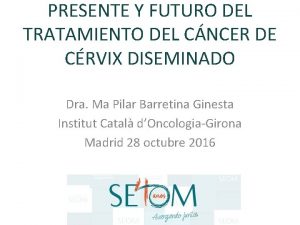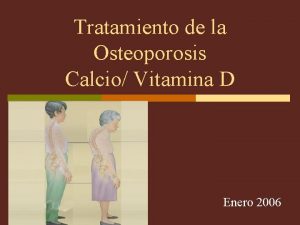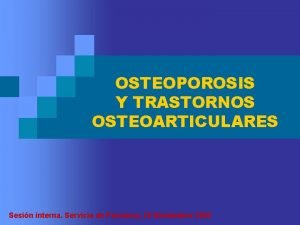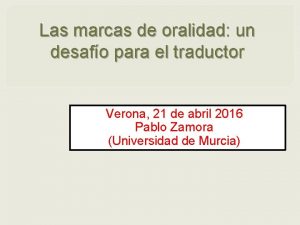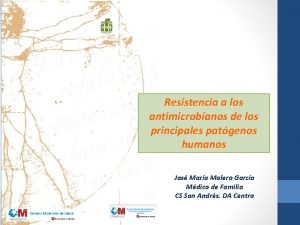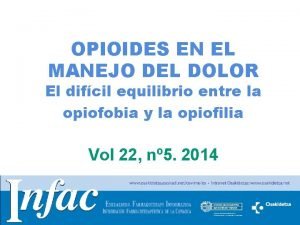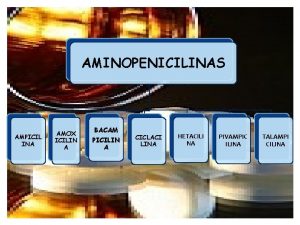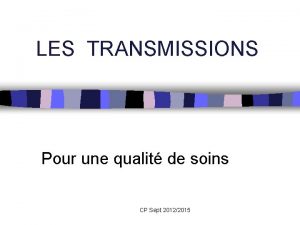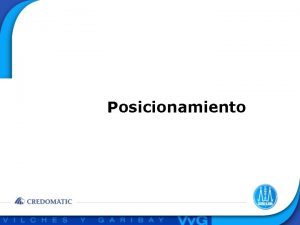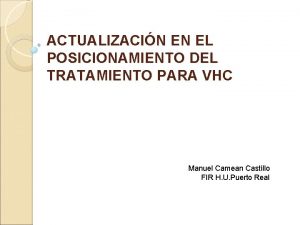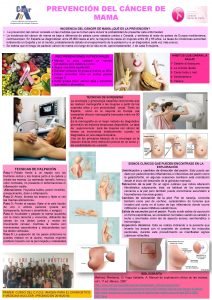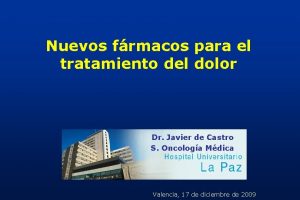Tratamiento del cncer con frmacos orales Posicionamiento de



































- Slides: 35

Tratamiento del cáncer con fármacos orales Posicionamiento de la SEOM Dr Ramon Colomer MD Anderson España

Tratamiento del cáncer Oncólogos Radioterapeutas Oncólogos Médicos Cáncer Cirujanos Médicos de Familia

Tratamiento Multidisciplinar del cáncer Oncólogos Radioterapeutas Oncólogos Médicos Cáncer Cirujanos Medicos de Familia

Tratamiento Multidisciplinar del cáncer: cada especialidad aplica su área de experiencia • • Medicina de Familia Cirugía Oncología Radioterápica Oncología Médica

Tratamiento del cáncer Oncólogos Radioterapeutas Oncólogos Médicos Cáncer Cirujanos Medicos de Familia

CREACION DE LA ESPECIALIDAD DE ONCOLOGIA MEDICA EN ESPAÑA. GUIA DE FORMACION DE MEDICOS ESPECIALISTAS Real decreto 2015/1978 (29 -VIII-78) Equipo editor

Oncología Médica La Oncología Médica es la especialidad que capacita para la evaluación y el tratamiento médico de los pacientes con cáncer.

Otras especialidades • Oncología Radioterápica La oncología radioterápica es una rama de la medicina clínica que utiliza la radiación ionizante, sola o en combinación con otras modalidades terapéuticas, para el tratamiento del cáncer y otras enfermedades no neoplásicas. • Urología La Urología es una especialidad médicoquirúrgica que se ocupa del estudio, diagnóstico y tratamiento de las afecciones médicas y quirúrgicas del aparato urinario y retroperitoneo en ambos sexos y del aparato genital masculino sin límite de edad, motivadas por padecimientos congénitos, traumáticos, sépticos, metabólicos, obstructivos y oncológicos. • Ginecología y Obstetricia Debe conceptuarse actualmente como Obstetricia y Ginecología una especialidad de contenido amplio y variado que entiende: 1. De los fenómenos fisiológicos y patológicos de la reproducción humana. 2. De la fisiología de la gestación, parto y puerperio, así como de sus desviaciones patológicas. 3. De la fisiología y patología inherente a los órganos que constituyen el tracto genital femenino, incluyendo la mama. 4. De los aspectos preventivos, psíquicos y sociales que necesariamente se relacionan con los apartados anteriores

Otras especialidades • Neumología La Neumología es la especialidad médica que se ocupa del estudio de la fisiología y la patología del aparato respiratorio, así como de las técnicas diagnósticas, terapéuticas y preventivas necesarias para conseguir sus objetivos. • Aparato Digestivo La especialidad de Aparato Digestivo se ocupa de las enfermedades del tubo digestivo (esófago, estómago, intestino y zona ano-rectal), hígado, vías biliares, páncreas y peritoneo y concretamente, de su etiología, epidemiología, fisiopatología, semiología, diagnóstico, pronóstico, prevención y tratamiento. Aparato Digestivo es una especialidad muy amplia, que incluye: la Gastroenterología Clínica, la Hepatología Clínica y la Endoscopia. • Medicina Interna La Medicina Interna es una especialidad médica de larga tradición, que aporta una atención global al enfermo adulto de carácter preferentemente hospitalario. Los internistas se forman bajo el principio de que ninguna enfermedad o problema clínico del adulto es ajeno a su incumbencia y responsabilidad

Tratamiento médico del cáncer: Vías de administración oral 1960 intravenoso 1990 oral 2010 Subcutanea, intratecal, intrapleural, intraperitoneal, transdermica, intranasal, rectal

FDA Approvals of Anti-Cancer Agents 2007 Newly Approved Agents Generic Name Lapatinib Trade Name Tykerb Temsirolimus Torisel Ixabepilone Nilotinib Ixempra Tasigna J Clin Oncol 26: 313 -325. © 2008 Indication(s) Date of Approval Breast cancer 3/13/2007 Advanced renal cell 5/30/2007 carcinoma Breast cancer 10/16/2007 Chronic Myelogenous 10/29/2007 Leukemia (CML)

FDA Approvals of Anti-Cancer Agents 2008 Newly Approved Agents Generic Name Plerixafor Trade Name Promacta (Revolade) Mozobil Degarelix Firmagon Everolimus Afinitor Eltrombopag Petrelli N J et al. JCO 2009; 27: 6052 -6069 Indication(s) Date of Approval Thrombocytopenia 20/11/2008 NHL and MM Advanced Prostate Cancer Advanced RCC 15/12/2008 24/12/2008 30/03/2009

Trend toward molecularly targeted anti-cancer drugs ONCOLOGY PRODUCTS 6 Hormonal Cytotoxic 32 27 49 67 Targeted 18 Market 2001 Development 2006 (Mc. Kinsey & Co. , NY)

Por que hace falta un posicionamiento?

Tratamiento del cáncer Oncólogos Radioterapeutas Oncólogos Médicos Cáncer Urólogos Cirujanos Internistas Digestólogos Neumólogos

El desarrollo de la Oncología Médica es muy distinto en Europa


Fármacos orales en oncología


Oral anticancer drugs can be toxic • Although the toxicity profiles of the newer molecularly targeted drugs are less focused on blood cells than those of the traditional chemotherapeutics, they are not, in any sense, insignificant (Table 2). • This class of drugs retains the potential for severe and possibly lethal adverse events, whose diagnosis and treatment cannot be properly handled by untrained physicians who do not work in a multidisciplinary environment. • Thus, any antitumor therapy, whether administered orally or i. v. , whether cytostatic or molecularly targeted, requires safe and careful handling by an experienced specialist and preferably one who has been formally trained in their use.

The evaluation of the clinical response is key to anticancer drug administration • Only the training programs in Medical Oncology specifically include this expertise. Furthermore, in some malignancies, such as GIST, the response criteria used are specifically tailored for a single disease [19]. • Physicians, if unfamiliar with oncology practice, will keep administering a drug as long as the patient seems to be tolerating it well, hence confusing ‘clinical appearance’ with ‘clinical response’.

A physician untrained in cancer therapy will administer an oral anticancer drug as monotherapy • Based on wider experience, a medical oncologist will choose the best treatment, either as monotherapy or in combination with other oral or i. v. antitumor drugs, depending on the patient's situation and the existence of published evidence which supports their use.

An untrained physician will be familiarized with one oral agent only • Treatment options offered to a patient may be just two: either to be treated with that single drug or to be not treated at all. • At the heart of a multidisciplinary team that includes a medical oncologist, many treatment options are available. Oral therapy is usually one among several possibilities. • In this era of individualized medicine, cancer treatment in inexperienced hands implies a clear limitation in the chances of tailoring treatments according to the individualized needs of a patient.

Oncology teams use protocolized care • Not only are anticancer drugs given according to specific and detailed written protocols but also the administration of complementary therapies, such as antiemetics, bone marrow growth factors, pain management, palliative care, information for the patient and relatives, genetic counseling services, or data inclusion in cooperative databases, is covered by strict procedural guidelines. • Outside the area of Medical Oncology, an inexperienced physician often works alone or in small groups, and hence a patient may suffer from inadequate treatment and support.

Anticancer drugs do not benefit all patients in the same way, and many efforts are oriented to the development of biomarkers that make cancer therapy more cost-effective. • In a context of finite budgets, it is important that the prescription of these drugs is done by trained specialists that are proficient in treatment selection. • Specific policy measures at the European and National levels should conduct reimbursement policies that take into account the prescribing physicians' specialty

Lastly, in everyday oncology practice, medical therapy and clinical research are so closely linked that it is almost unthinkable to consider them apart • The inclusion of patients in large cooperative clinical trials not only constitutes the best treatment option for many patients but is also a key element in the development of cancer therapy. • For patients, being treated outside the oncological expertise may result in missing the opportunity to be included in a clinical trial. For clinical research itself, this may translate into a decrease in the number of patients recruited in clinical trials and in a difficulty in controlling selection bias.

Summary • The prescription of anticancer drugs by physicians who are not oncology experts may compromise the current standards of safety and efficacy in the medical care offered to cancer patients and the high quality of cancer research. • SEOM wishes to alert our European Medical Oncology colleagues, the European national health care providers, the international oncology community as a whole, and the general public about this situation and to encourage awareness among health care providers.

R. Colomer, E. Alba, A. González-Martin, L. Paz-Ares, M. Martín, A. Llombart, A. Rodríguez Lescure, J. Salvador, J. Albanell, D. Isla, M. Lomas, C. A. Rodríguez, J. M. Trigo, J. R. Germà, J. Bellmunt, J. Tabernero, R. Rosell, E. Aranda, R. Cubedo and J. Baselga on behalf of the Spanish Society of Medical Oncology

Tratamiento del cáncer con fármacos orales Posicionamiento de la SEOM Dr Ramon Colomer MD Anderson España

La quimioterapia contra el cáncer cumple 65 años en 2010 EN 1945 SE HIZO PÚBLICA LA INVESTIGACIÓN SOBRE LAS MOSTAZAS NITROGENADAS (QUE SUGERÍA SU USO POTENCIAL EN LEUCEMIAS Y OTROS CÁNCERES)

Molecular targeting of cancer. . finding the right fit


FDA approvals of anticancer agents: October 2008 to September 2009. Petrelli N J et al. JCO 2009; 27: 6052 -6069 © 2009 by American Society of Clinical Oncology

Tratamiento del cáncer

Oral anticancer drugs can be toxic
 Frmacos
Frmacos Anticolinergicos
Anticolinergicos Procineticos
Procineticos Cncer
Cncer Investigacionales
Investigacionales Ejemplos de segmentacion geografica
Ejemplos de segmentacion geografica Neoasociacionista
Neoasociacionista “control de grua” and posicionamiento
“control de grua” and posicionamiento Listado de aspectos positivos de mi desempeño en la vida
Listado de aspectos positivos de mi desempeño en la vida D
D Clasificacion de corticoides
Clasificacion de corticoides Hiperkalemia
Hiperkalemia Tecnologia end of pipe
Tecnologia end of pipe Ligamento periodontal
Ligamento periodontal Tipo de texto oral
Tipo de texto oral Que son los textos narrativos
Que son los textos narrativos Esto significa
Esto significa Organizador grafico de expresion oral
Organizador grafico de expresion oral Las marcas de oralidad
Las marcas de oralidad Tradiciones y testimonios orales
Tradiciones y testimonios orales Rasgos formales de un texto
Rasgos formales de un texto 5 textos argumentativos cortos
5 textos argumentativos cortos Espectro ceftriaxona
Espectro ceftriaxona Opioides orales
Opioides orales Ertopenem
Ertopenem Sustantivos biformes en guarani ejemplos
Sustantivos biformes en guarani ejemplos Lincosanidos
Lincosanidos Antipseudomonas orales
Antipseudomonas orales Les transmissions écrites et orales
Les transmissions écrites et orales Características de la leyenda
Características de la leyenda Eliminación de muletillas en textos orales y escritos
Eliminación de muletillas en textos orales y escritos Techniques de communication orales ppt
Techniques de communication orales ppt Consonante orales
Consonante orales Que es describir
Que es describir Cualidades de la voz uso de pausas
Cualidades de la voz uso de pausas Presentaciones orales efectivas
Presentaciones orales efectivas



